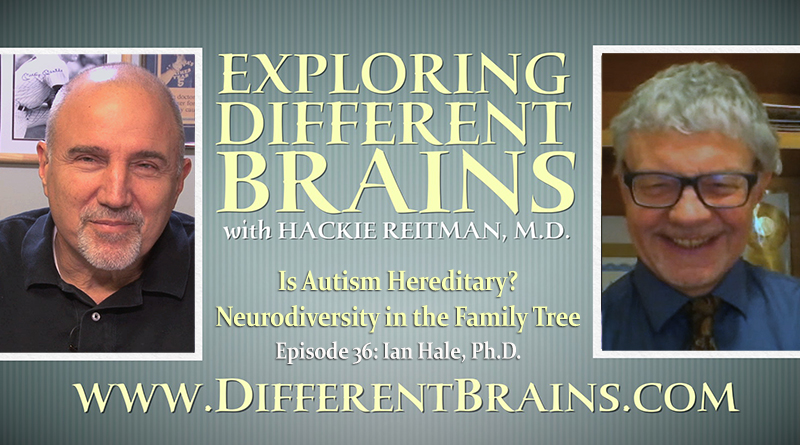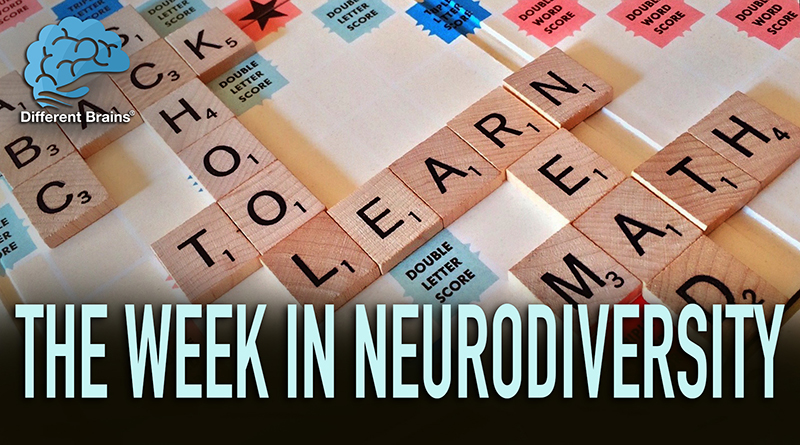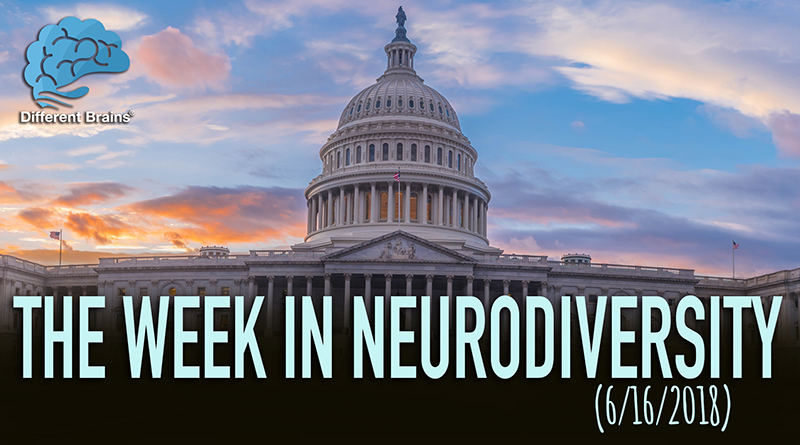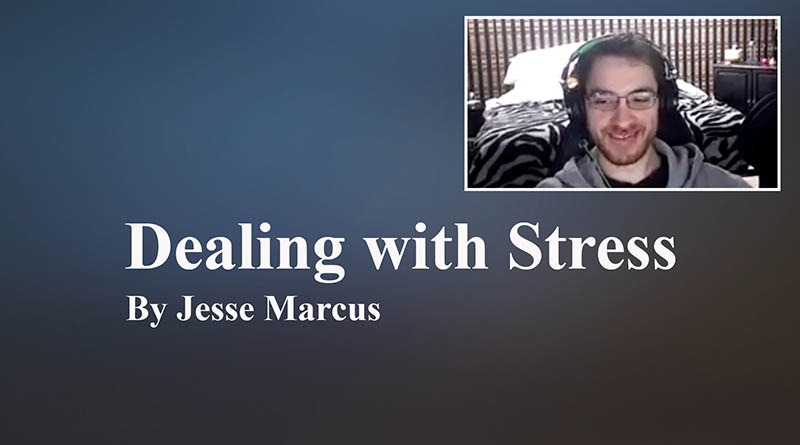
Is Autism Hereditary? Neurodiversity in the Family Tree, with Ian Hale, Ph.D. | EDB Episode 36
In this episode, Harold Reitman, M.D. speaks with Ian Hale, Ph.D., a writer, poet, public speaker and researcher who happens to be on the autism spectrum. Dr. Hale discusses his belief that autism and Asperger’s should be considered separate, the research he has done that suggests autism has been in his family for centuries, and the importance of not discouraging the neurodiverse during childhood.
For more information, visit: ianchalephd.com
Look for Dr. Hale’s books at Amazon.com-
The Insider’s Guide to Autism and Asperger’s
27 Second Preview:
To listen or download the podcast version of this episode, see the embedded player below.
Or look for us on your favorite podcast provider:
iTunes | Stitcher | SoundCloud
[expand title=”View Full Transcript”]
HACKIE REITMAN, M.D. (HR):
Hi, I’m Dr. Hackie Reitman, welcome to another episode of Exploring Different Brains. We have the pleasure today of speaking with Dr. Ian Hale, who is a rather interesting poet, researcher–he does it all. This guy does it all. He’s an author, he writes–Dr. Ian Hale, welcome to Different Brains, how are you?
IAN HALE, PhD (IH):
Very well, actually, thank you Dr. Reitman, and I say thank you for inviting me and thank you to all the viewers for watching this as well. It’s a great privilege.
HR:
Well, thank you very much. Why don’t you introduce yourself to our audience, because they want to hear all about you.
IH:
I don’t know where to start, but I’ll start by saying this is what a person who is autistic and also severely Asperger’s syndrome looks like and sounds like. My background is, when I was born in Bristol in the southwest of England and educated at Wellsway School. I then went to Aberystwyth University and took an arts degree, having previously trained as a laboratory chemist with Cadbury Schweppes. So I got my British Pharmaceutical Association grade four as a laboratory analyst. I then became a teacher and taught for many years both in ordinary education and in special education, before becoming a college lecturer and finally a university lecturer, but which point I felt that I’d gone as far in the education department as I could go, and I left to pursue my own research at a different university called Bath Spa University.
HR:
Somewhere along the line, you can tell us where, you figured out that you’re autistic. Is that correct?
IH:
Well, I was a problem at primary school. I think we were good in elementary school. I wasn’t really doing anything in school, and Britain didn’t know anything about this in the 1960s-1970s. I mean the term Asperger’s syndrome was first used in Britain only in 1996. It wasn’t until I was working at university when one of my students came with a file from the students’ home country, saying the particular student has Asperger’s syndrome. But I started to research Asperger’s and realized that, my goodness I take 52 out of every 50 of these boxes and then I went to see a world renowned specialist at Carleck University, called professor William Braizer, and he diagnosed me fully. A diagnosis which had been confirmed by the university of Cambridge, and also by analyzing my genome, because all autism is inherited normally by design. At that stage, I researched my family history back about 250 years and realized that some of these were pretty weird people as well. Reading their letters and their correspondents and what people have said about them, math book and thesaurus.
HR:
And now–so you’ve spoken all over the world and you trace your lineage with autism back, I don’t know, what, a couple of hundred years?
IH:
Well it certainly was into the 1750s, yes, that I’ve been able to so far.
HR:
Wow.
IH:
I found out about a great, great, great, great grandfather of mine who was into the famous Bedlam Insane Asylum in London. Back then a hospital. And I’ve seen some of the things that he wrote from that, and what he wrote about all those years ago. That was in the 1760s. And on from there, I now recognize from professional experience, that my grandfather was also very aspie as well. And I have aspie cousins.
HR:
Now do you consider yourself–and do you make a distinction between–Asperger’s and autism?
IH:
Personally, I do. I believe that they share genetic sequences in common. I think that both of those are overlapping with other versions of neurodiversity in the same way as the rings on the Olympic flag over there, but I think that Asperger’s is one of those spaces where the rings intertwine and that it is both a part of autism, a part of schizophrenia, but also, an entity within itself and within those. So I do, in the same way as the international classification of disease with the health organizations to make a clear distinction between autism and Asperger’s. I agree with that, and that’s what I say.
HR:
Now do you think that it’s all genetics, or its multi-factorial where the genetics certainly play a role, and then you have environmental, then you have the gut-brain, and then you have all of these other factors–is that what you think?
IH:
Yes, I look at autism–I defined in the Insider’s Guide to Autism and Asperger’s, what I wrote–I have defined two distinct categories of autism. What I call capital autism, which is purely inherited. Or the disposition to get it is purely inherited. And then there’s acquired autism, where people will display the full symptoms of autism due to environmental factors–for example: heavy metal poisoning, or poisoning by pesticide; certain drugs can mimic autism, a traumatic brain injury–a big bang on the head, causing brain damage, can cause a person to have autistic symptoms. And yes, Dr. Reitman–the point you make, the connection between autism and the gut between Crohn’s disease and Celiac disease–we now know from the latest genetic explorations that these are very very linked together. And its why autistic people often display intolerances. For example, I can’t eat citric food. I never get to enjoy an orange or a grapefruit, and I have to have lactose-free milk, otherwise I shall get a migraine. And there are few others that I wouldn’t worry with them.
HR:
Now are you in Spain now or are you in England now?
IH:
I’m currently in Spain. English winters don’t suit my back or neck, I’m afraid. Or my sinuses.
HR:
So you find, in Spain, you’re much better off than in England?
IH:
Yes. I live near the sea in Spain, so the salt in the air helps with my sinuses, and, of course, it’s a great deal warmer, which makes a great deal of difference to me. I like Spain, it’s a beautiful country. So basically I spend the winters, up to around June, in Spain and then England. And that there is, you know, year-by-year, but that’s what I try to do. But most of the writing, I’ve done in Spain.
HR:
How do you spend your days in Spain? What is an average day in the life of Dr. Ian Hale?
IH:
Oh, pretty boring to be quite honest with you. I like to keep in touch with my friends and relatives in England and all around the world. I have a large number of relatives in America, far more than I do in England. If I’m writing, I’m writing. I like to go out and see–I’ve made some–I’ve been very, very lucky and made some wonderful, truly wonderful friends here, whose company I greatly enjoy, and that’s a rare thing for somebody who’s an aspie. People here tend to be less busy. Spain has a completely different day. It’s a very late-night culture, so–I know plenty of people who never go to bed before mid-day, and I know people who don’t get up before 11 o’ clock at night, particularly in the summer because it’s so hot. So, in a way, to answer your question there–there is no sort of typical day, but I do try to get some work done every day–to try to learn something more, to try to communicate more. If it’s only writing an email to someone who’s written to me about autism, if I just do that, then that’s great because my ambition, and I’ve got plenty–is first of all to publish the sequel that I’ve written to the Insider’s Guide to Autism & Asperger’s, I want to do a lot of interviews and this is why I’m so grateful for this opportunity as well, of course.
I’d like to do lecture tours and I’ve also got research in the autism that I’d very much like to do, because I have got a couple of theories of my own regarding hematology, which would take quite a bit of work–and to develop better therapies, better ways of allowing autistic people to communicate with the neurotypical world and vice-versa. For example, I was reading the other day, something that was very interesting–that in the Russian Federation, autistic children can do their examinations face-to-face, for example, instead of having to write if they’re dyslexic. Or they can also do it through puppetry, or through an avatar on a computer–and I think that is brilliant, and I would really like to be in the vanguard of developing that kind of technology to make it really good, because it isn’t great this far, and to bring that into the world and to share that across, because I think the big problem that, although the normal world and the autistic world do interact to some extent–the big problem is communication. And both sides have to learn a common language, whether it–I think music is a wonderful thing and a wonderful therapy, and listening to music is something–you ask about a typical day–is something that I try to do every day, in the same ways I try to meditate every day, to keep an even and balanced mind, I hope.
HR:
You see, I think you’re making an even bigger point, Ian, though, which is this: that because all of our brains are wired differently, and because we might all process things differently, lets focus, instead of focusing on one-size-must-fit-all in a monolith–lets tune-in as I do now, since I had this “A-Ha!” moment a couple of years ago, and say how does this persons brain work? And if it works best by doing communicating with puppetry, give them a puppet. An interview that I did with Matthew Schneps at MIT and Harvard who is a dyslexic astrophysicist who now has a visual learning institute in Boston, he said, ask me any math problem right now–I said how much is seven times six? He said I have no idea. My brain wont file that. But I have a calculator and when I was in college I used the slide rule, so what’s wrong with using that technology, instead of insisting, you’ve got to do it my way or the highway? And that’s what you were just saying, and I agree with you about 8,000%. And that’s what we need to do–we need to stop the negativity that someone’s brain works differently, it’s not negative, it’s just different–let’s give them what they need to maximize their productivity, their independence, their ability to make a living, I think.
IH:
I agree 1,000%. It’s a wonderful story, I think, that Thomas Edison told. What really happened was that he was doing very badly at school, in the same way as Albert Einstein did very badly at school, really Einstein School reports is very eye-opening, but to return to Edison, the headmaster of the school he was attending wrote a letter to his mother and the content were, and obviously I’m paraphrasing, basically, your son is a disruptive idiot, we don’t believe that he is a person capable of being educated and the school no longer can do anything for him. Please keep him home. And they put this letter into the envelope and marked it to Edison’s mother. He took it home, he gave it to his mother, who opened it, and he said, Mom, mom! What does the headmaster say? And she said Thomas, he’s written here that, and I quote, your son is a complete genius. We feel that our school has taught him as much as is possibly can and that there is no point, therefore, in young Thomas attending this school anymore. And it wasn’t until years later that he found this letter, after his mother had died, that he realized how important that was to him–and you said earlier, about the influence of environment, and the importance of being positive, and that proves, Dr. Reitman, exactly what you said.
And also, I try to give examples, and I’ve given quite a few in the book, of people who are neurodiverse, who are not neurotypical, who aren’t “normal.” And of course, one of them was professor John Nash, the Nobel prize winner who won the Nobel prize for mathematics, who is the subject of a very famous Oscar-winning film with Russell Crowe, called a beautiful mind, and Nash was schizophrenic. And we know that geniuses from the autism world, I mentioned Einstein, who was autistic and Asperger’s–probably the greatest of all physicists, Nikola Tesla, another one–Leonardo we know was, Michelangelo we know was–the great English writer, Virginia Wolf, we know was. We know that Mr. Gates from Microsoft is Asperger’s syndrome, and has always been a champion of it, and probably the most famous example played in a film by Claire Dames, is of course, Dr. Temple Grandin, who is the standard there for aspies all around the world, and was the first person to really get out there and say, look, we have a lot to offer as individuals and as a group, historically, we have. Give us the tools and we will do the job, to quote. And it’s great that companies like Microsoft have come to understand this, and they’re going around and actively looking to recruit people on the spectrum because they do have a different set of gifts. As you say, different brains, different gifts, and people are just beginning to realize that there’s something special there. And that is why I’m so keen to get out and do these tours and make appearances and explain to the world that, hey, we have something to say as well, and we want to contribute passionately, now give us the opportunity, listen to what we have to say, well listen back and well find common ground to promote the common good, and that’s what I’m about.
HR:
That’s fantastic, and I salute you. Who is your shining mentor?
IH:
Well I’ve got to say, it was my mom and dad and my amazing grandfather. They were–we were very poor growing up–very, very poor. And I mean not being able to heat the house during the winter poor–but my parents were very educated people, and instilled a love of learning into me, which I did not take to school, but there were always books in the house–there were always games like scrabble that were a diversion, they always found ways–or my grandfather found ways to buy me interesting toys, and I remember–I couldn’t have been more than five-years-old, Dr. Reitman, my grandfather brought me a kaleidoscope, and the countless hours that I stared into that cardboard tube and turned it around and looked at all of those fascinating colors, and then a family friend, a few years later, probably when I was about age of nine, built me a telescope. It was about a yard long, made of a cardboard tube with an eyepiece on one and a lens each end, and I was able to see the stars.
But I tell you a very sort of interesting and, I think, probably defining story–when I was about seven, I remember one evening, my favorite teacher from school, and her name was Mrs. Crawford, and I think she was the only teacher in the school who had belief in me, because the headmaster had already told my parents that he thought I was a complete idiot and a waste of time, and a disruptive and rude waste of time because I wasn’t listening to everything, but Mrs. Crawford had a different opinion for some reason, and one evening, she came by to see my parents and said, look, we have a problem here–Ian is six, seven, eight years old (whatever I was–) and he’s not reading or writing. He can’t read or write. My parents said that is absolute nonsense. Ian reads and writes very, very well. He’s been able to write since he was three years old, and read even earlier than that. And Mrs. Crawford said, well, no, at school, not. And at this point, my dad told me the story afterwards, and this was the point where I actually came–my parents called to me because I was in my bedroom, and my father got a book off of the bookshelf, and I remember it was a book of poems by Tennyson, if I remember correctly.
HR:
Lord Alfred Tennyson! Crossing The Bar.
IH:
Yes, yeah. And my dad motioned me over, and I saw Mrs. Crawford there and, you know, what’s the teacher doing in my house at tea time, you know? I was really shocked. And my dad said, Ian, open the book at random. And I just opened it. And he said, would you be kind enough to read what Tennyson has written? And I remember to this day, the poem was the Charge of the Light Brigade. I read the first page of it and I remember the look on Mrs. Crawford’s face, and I can’t describe it, but she went as white as a sheep, and I started the next page, and my dad said, okay, okay Ian. That’s enough. Took the book back from me and then said, Ian, would you go into your bedroom and bring your notebooks out? Because my parents used to buy me little lined-notebooks of the type they used at school, with paper covers and ruled pages inside them. And my dad said, bring a couple of those in to show Mrs. Crawford, and I did.
And they had the beginnings of my observations on the day, descriptions, little stories about our dog Raggy–I remember writing in them, because we had a little dog. And just details of running around with my friends. I remember writing a bit about trying to make a bow-and-arrow for myself. Anyways, I gave the–he said, give the books to Mrs. Crawford, and she could see very clearly that, you know, obviously Ian CAN read. And she just turned to my mom and dad, because she never sat down the whole time, she was standing the whole time, and my parents were sitting, and she said, well, he doesn’t do it at school. And my father said, okay, thank you. I’ll have a word with him. And my parents asked my why, and I said, well, what do they do at school? They’re just kids’ books, they’re so boring, I’m not interested. I’ve got wonderful stuff here, this is what I want to read and learn. And that’s the story.
HR:
That’s a great story.
[/expand]
This video is owned by Different Brains Inc, kindly donated by it’s original producer PCE Media LLC.
Different Brains® Inc. founder Harold “Hackie” Reitman, M.D. is an author, filmmaker, retired orthopedic surgeon, former professional heavyweight boxer, the past chairman and president (and current board member) of The Boys and Girls Clubs of Broward County, and a neurodiversity advocate. However, it was his role as a father that led to the creation of the DifferentBrains.org website.
Hackie’s daughter Rebecca grew up with epilepsy, 23 vascular brains tumors, and underwent 2 brain surgeries before the age of 5. Her struggles and recovery put him on the road to, through 26 professional heavyweight boxing matches, raising money for children’s charities (to which he donated every fight purse).
Rebecca eventually went on to graduate from Georgia Tech with a degree in Discrete Mathematics, and Dr. Reitman wrote and produced a film based on her experiences there (The Square Root of 2, starring Darby Stanchfield of ABC’s Scandal). After graduation, Rebecca received a diagnosis of Asperger’s syndrome. Hackie, shocked at his own ignorance of the topic despite being an M.D., embarked on years of research that culminated with his book Aspertools: The Practical Guide for Understanding and Embracing Asperger’s, Autism Spectrum Disorders, and Neurodiversity (released by HCI books, publishers of the Chicken Soup for the Soul series).
This experience revealed to Hackie the interconnectedness of the conditions that fall under the neurodiversity umbrella, while alerting him to the in-fighting and fractured relations that often plague the organizations tasked with serving the community. Convinced that overcoming these schisms could help all of society, Hackie forged the Different Brains philosophy of inclusive advocacy: “Supporting Neurodiversity – From Autism to Alzheimer’s and All Brains In Between”.
In the company’s initial years of operation, Hackie self-financed all of the content on DifferentBrains.org, all of which offered free to view to the public. Currently he is the host of our weekly interview show Exploring Different Brains, writes blogs for the site, and tours the country speaking at conferences, conventions and private functions, all with the goal of improving the lives of neurodiverse individuals and their families, and maximizing the potential of those with different brains. Separate from Different Brains, Hackie is the founder and CEO of PCE Media, a media production company focusing on reality based content. He recently co-executive produced the documentary “Foreman”, the definitive feature documentary on legendary boxer and pitchman George Foreman.




